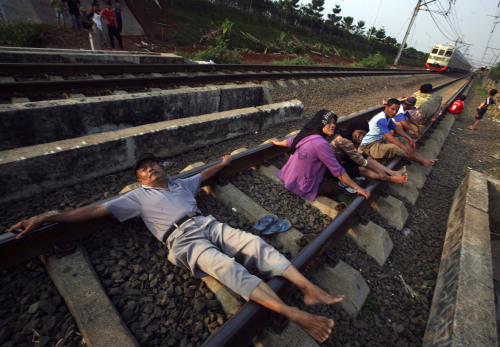JAKARTA (AP) -- Ignoring the red-and-white danger sign, Sri Mulyati walks slowly to the train tracks outside Indonesia's bustling capital, lies down and stretches her body across the rails.
 |
Villagers lie on a railway track for an electricty therapy in Rawa Buaya, Jakarta, Indonesia. (AP-Yonhap News) |
Like the nearly dozen others lined up along the track, the 50-year-old diabetes patient has all but given up on doctors and can't afford the expensive medicines they prescribe.
In her mind, she has only one option left: electric therapy.
“I'll keep doing this until I'm completely cured,'' said Mulyati, twitching visibly as an oncoming passenger train sends an extra rush of current racing through her body.
She leaps from tracks as it approaches and then, after the last carriage rattles slowly by, climbs back into position.
Pseudo-medical treatments are wildly popular in many parts of Asia -- where rumors about those miraculously cured after touching a magic stone or eating dung from sacred cows can attract hundreds, sometimes thousands.
That may be especially true in Indonesia, where chronic funding shortages and chaotic decentralization efforts since the 1998 ouster of longtime dictator Suharto have left many disillusioned with the state-sponsored health system, said Marius Widjajarta, chairman of the Indonesian Health Consumers Empowerment Foundation.
Medical experts say there is no evidence lying on the rails does any good.
But Mulyati insists it provides more relief for her symptoms -- high-blood pressure, sleeplessness and high cholesterol -- than any doctor has since she was first diagnosed with diabetes 13 years ago.
She turned to train track therapy last year after hearing a rumor about an ethnic Chinese man who was partially paralyzed by a stroke going to the tracks to kill himself, but instead finding himself cured.
It's a story that's been told and retold in Indonesia.
Until recently, more than 50 people would show up at the Rawa Buaya tracks every day. But the numbers have dropped since police and the state-run railroad company erected a warning sign and threatened penalties of up to three months in prison or fines of $1,800.
No one has been arrested yet, and none of the participants in train track therapy has died.
But the dedicated dozen a day who still come say they have no plans to stop.
“They told us not to do it anymore, but what else can I do,'' said Hadi Winoto, a 50-year-old stroke victim who has trouble walking.
“I want to be cured, so I have to come back.''
<한글 요약>
철로에 흐르는 전기로 병을 치료한다?
철로에 누워 있으면 흐르는 전기로 인해 병이 치료 된다고 믿는 인도네시아인들이 많아져 인도네시아 철도 당국이 단속을 강화하고 있다.
당뇨환자인 스리 물리야티 (50)는 비싼 진료비를 감당할 수 없을뿐더러 의사들도 자신의 병을 포기했다고 말하며 철도에 흐르는 전기가 고협압과 불면증에 큰 효과가 있다고 주장했다.
하지만 의사들은 철도에 흐르는 전기의 강도로 인해 쇼크로 치명상을 받을 수 있는 위험이 크다고 경고했다.
매일 “철로 테라피”를 위해 50명이 넘는 사람들이 자카르타의 한 기차역에 모였었지만 최근 들어 경찰의 단속이 심해지면서 그 수가 줄어 들고 있다.
단속에서 적발될 시에는 징역 3개월형 또는 200만원 가량의 벌금형을 받게 된다.








